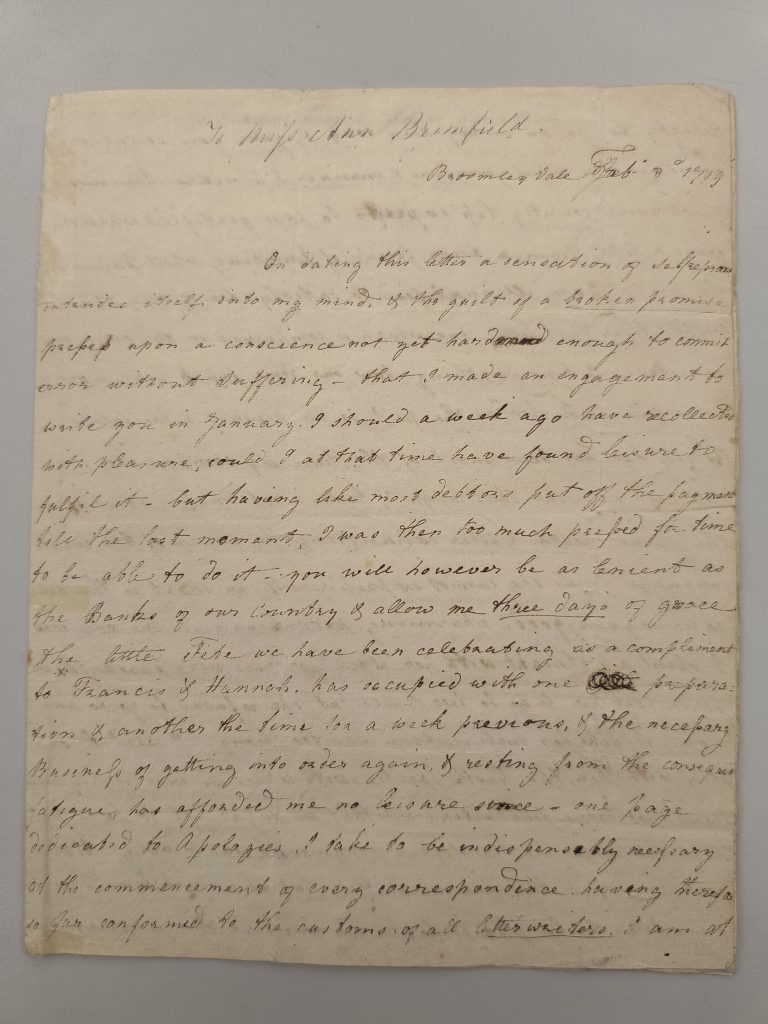by Susan Martin, Senior Processing Archivist
In previous Beehive posts, I’ve introduced you to several members of the Clarke family. Well, the Clarkes were related by marriage to the illustrious Boston Lowells, so the Perry-Clarke additions at the MHS also include papers from members of that family.
If there were prizes for the most prevalent 18th- and 19th-century Boston Brahmin names, “Anna Cabot Lowell” would have to be up there. Our catalog lists four of them, and that doesn’t even include married women or namesakes. The one I’d like to highlight today is Anna Cabot Lowell (1768-1810), a.k.a. Nancy.

Nancy was born in Newburyport, Massachusetts, on 30 March 1768, the oldest of Judge John Lowell’s nine children. Her biological mother, Sarah (Higginson) Lowell, died when Nancy was four years old, and her father re-married twice. Nancy herself never married or had children, and died of tuberculosis on 18 December 1810 when she was 42 years old.
But her family connections aren’t the reason I wanted to write about Nancy today; her letters are just really entertaining! To give you a sense of her style, here’s what she wrote about her friend Betsey Lee on 3 February 1799.
She still laughs & Rants, is rational & absurd in the same breath, & after exhausting the powers of the English language finds she cannot express herself – in short is the same extravagant, good, charming, provoking girl she ever was. […]
I went to one play with her, the Castle Spectre, with which we were highly entertained. We were told afterwards that we ought not to have been […] but we unluckily suffered ourselves to be pleased before we considered the propriety of being so and have been honest enough to own it.
A prolific correspondent with a wide social network, Nancy was one of those people who elevated letter-writing to an art. Her friends included Ann Bromfield (later Mrs. Tracy); Eliza Susan Morton Quincy, wife of Congressman Josiah Quincy; and Scottish author Anne MacVicar Grant. The Perry-Clarke additions contain many of her letters to Bromfield—like the one quoted above—and the MHS also holds a collection of her correspondence with Quincy and Grant.
Nancy’s letters are alternately funny, mournful, worried, silly, and philosophical, but always intelligent and well-written. The gossip also flew fast and furious, especially when it came to who was “paying attentions” to whom. In fact, some of the gossip may have been too much for Anna’s niece, another Anna Cabot Lowell (1808-1894), who compiled her aunt’s letters in 1881. In addition to adding a few explanatory annotations, this younger Anna was probably the one who scribbled out some apparently incriminating passages.
According to Eliza Quincy’s memoir, “For intellectual gifts and exalted character, Miss Lowell held an acknowledged pre-eminence among her contemporaries in Boston. Her writings, both in prose and verse, are stamped with genius.”
Quincy’s youngest daughter, named in her friend’s honor, also had a way with words and became a published poet.

